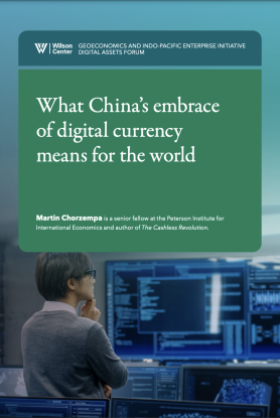What China’s embrace of digital currency means for the world



China has become one of the world’s foremost innovators in the world of digital currency and finance, in many ways leapfrogging the United States. As recently as 2013, China’s financial system was cash-based, low tech, and repressive—hardly a model for the future of finance. Yet, in the blink of an eye, digital platforms took over payments and just about any transaction for daily life in China could be completed with a mobile phone only. Chinese people stopped carrying wallets, and even beggars went digital with QR codes hung around their necks for mobile donations.
In contrast, it is now the United States which still clings to paper checks and plastic cards. The flow of ideas in this world of financial technology, or fintech, from Silicon Valley to China has reversed, with US tech titans such as Mark Zuckerberg and Elon Musk as well as major US banks learning from China about what the future of finance could be. The benefits of China’s digital finance and currency revolution accrue not only to its companies. They grant a form of soft power to the Chinese authorities too, showcasing their technical prowess and facilitating financial interconnection with the rest of the world.
Today, policymakers in Washington worry that China’s financial innovations will empower attempts to internationalize its currency, eroding the dominant position of the US dollar. China’s Central Bank Digital Currency (CBDC), the eCNY, is already involved in experiments with other central banks aiming to trade directly with each other’s currencies instead of going through the US dollar. That in turn could reduce the potential reach of US sanctions and blunt Washington’s financial power.
Other concerns include a scenario in which other countries adopt the eCNY for payments or that China will force US companies to transact in eCNY, increasing Beijing’s ability to surveil financial transactions and potentially impose sanctions of its own. Even if the United States can keep them out of its market, Chinese fintech companies and banks could also outcompete US companies in other markets.
So far, the worst fears of US policymakers have yet to pass, as geopolitics and struggles adapting to foreign markets has hampered attempts from
Chinese fintech companies to become truly global players. Beijing's bet on CBDC faces other constraints that make it unlikely to dethrone the
Author
Martin Chorzempa is a senior fellow at the Peterson Institute for International Economics and author of The Cashless Revolution.

The Indo-Pacific Program promotes policy debate and intellectual discussions on US interests in the Asia-Pacific as well as political, economic, security, and social issues relating to the world’s most populous and economically dynamic region. Read more


